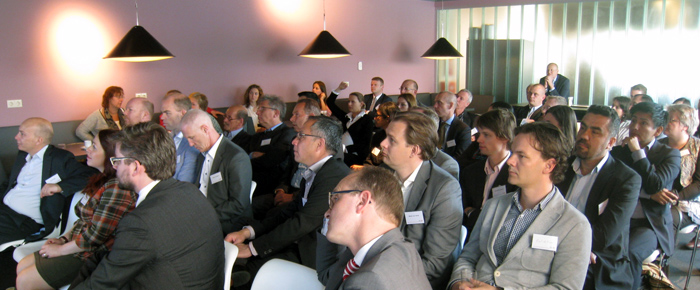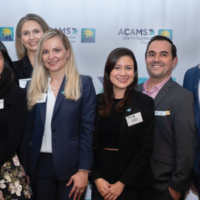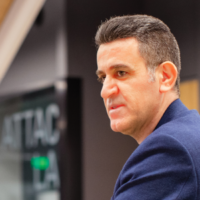
On Thursday, May 15, 2014, about 50 financial crime professionals gathered in Amsterdam to discuss the anti-money laundering (AML) risks inherent to crypto (virtual) currencies and to listen to three different expert opinions on bitcoins. The seminar was sponsored by ING Bank and it was organized by both the ACAMS Netherlands Chapter and the ACAMS Canada Chapter. The session proved to be very popular amongst ACAMS members and other invited compliance professionals.
Speakers and Insights on Bitcoins
As always, the speakers made all the difference in the event. There were two lawyers—Dutch and Canadian— who shared their views on the legal developments in each country. The speaker from a Dutch Investigative Unit of Tax Authority shared examples of practical cases when bitcoins were used in money laundering or other financial crimes.
Andries Doets, lawyer at Finnius (Dutch Law firm), said that the Dutch Central Bank (DNB, the regulator) does not recognize bitcoins as being subject to the current Act on Financial Supervision, and considering law volumes of Bitcoin operations in the Netherlands, sees no point in adopting any specific regulations on virtual (crypto) currencies. Interestingly enough, the market is asking for clear rules. For example, Bitonic B.V., a recently formed Dutch stock exchange for bitcoins, applied for a DNB license, saying it wants to operate in full compliance with the rules and keeps an ongoing dialog with DNB. Furthermore, the Dutch tax authorities do have an approach to taxing bitcoins either as income or as assets. The European Central Bank, however, is contemplating regulations for virtual (crypto) currencies, and we might see change in regulatory soon.
Christine J. Duhaime, barrister and solicitor at Duhaime Law and co-chair for the ACAMS Canada Chapter, shared her opinions and experiences from the Canadian/North American perspective. We learned that in contrast to the Netherlands, Bitcoin is regulated in Canada. After the initial success of a bitcoin cash machine located in a coffee shop, the company-owner could not place the generated money into the local banking system due to the fact that the source of funds was not clearly established. This spelled the end for the cash machine in Canada, but the company remains operational in other parts of the world. Further, Duhaime highlighted the legal risk of Bitcoin from a consumer perspective since there is no way to retrieve lost or stolen bitcoins and there are no compliant procedures. There are also many risks for bitcoins to be used for tax evasion, sanction dodging and so forth. The main advice to financial institutions is not to take shortcuts in AML and sanction compliance programs that concern bitcoins and similar crypto (virtual) currencies.
Bobby McFaul, strategic intelligence officer at the Fiscal Information and Investigative Unit for Dutch Tax Authority (FIOD), has just completed his research at Utrecht University on qualitative scenario-study into underground digital money flows. He explained some technical details of Bitcoin functions, and discussed three real-live investigative cases involving bitcoins. One case was a Bitcoin mining operation that got into the FIOD spotlight due to an excess amount of uncommon electricity used for that sort of building. Apparently, mining requires a lot of electricity capacity, and in this particular case, the electricity was stolen from neighbors. McFaul concluded that even though Bitcoin is changing the playing field, the criminal behavior related to it is the same. Further responses of law enforcement needs to be catered to the specific Bitcoin characteristics, although classic investigative measures still yield results.
He concluded his discussion by saying that he expects Bitcoin never to become a mainstream payment method but that it will continue being a tool for financial crime.
To conclude, we would like to thank ING Bank who made this event possible by facilitating the location and networking drinks. We are also grateful to Christine Duhaime and the ACAMS Canadian Chapter for the idea and co-organization of this event.
ACAMS Netherlands Chapter
The ACAMS Netherlands Chapter was launched in June 2011 with a three-member board and now has five dedicated executive board members:
- Chair – Yevgeniya Balyasna-Hooghiemstra
- Secretary – Ben Scheffer
- Membership director – Antal Ruiter
- Programming director – Sabahat Ullah
- Communications director – Maxim van Veluw
The chapter aims to host four to five knowledge sharing afternoon seminars per year that are relevant to financial crime professionals working in the Netherlands within banking, insurance, real-estate and corporate services sectors. The chapter has earned its good reputation by organizing useful, sometimes controversial events, on a professional level, usually inviting speakers from various sectors (public, private and consulting) to streamline the industry dialogue. All events finish with the sponsored drinks to provide networking opportunities and to foster AML professional development in the Netherlands.










